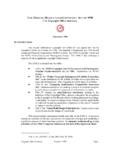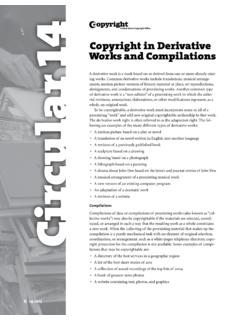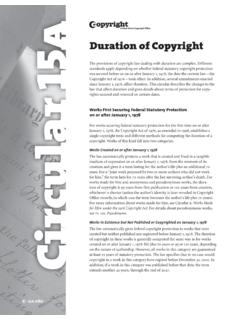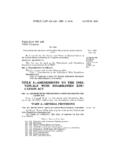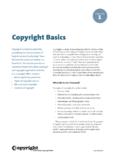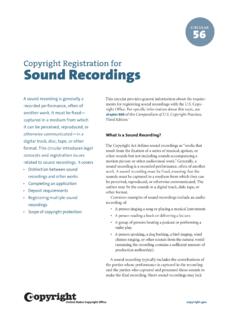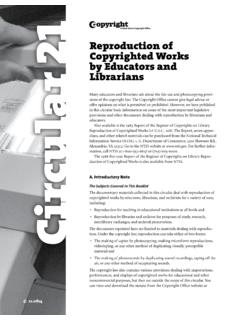Transcription of Circular 66 Copyright Registration of Websites and Website ...
1 CIRCUL AR. 66. Copyright Registration of Websites and Website Content The Copyright Act does not explicitly For Registration purposes, a Website is a web page or set of recognize Websites as a type of interconnected web pages, including a home page, located on the same computer or server and prepared and maintained copyrightable subject matter. However, as a collection of information by a person, group, or you may be able to register a Website organization. Although a Website may contain text, artwork, photographs, music, videos, or other copyrightable content, or a specific web page if it satisfies the Website itself is not typically considered a copyrightable certain statutory requirements. This work. However, you may be able to register a Website or a Circular focuses on Registration issues specific web page if it satisfies the statutory requirements for a compilation or collective work. involving Websites and Website Websites differ from databases and computer programs content.
2 It covers for the purposes of Registration . A database is a compilation How to identify the author of of digital information, accessible solely by an information retrieval program. A computer program is a set of statements a Website or instructions to be used directly or indirectly in a computer How to identify copyrightable to bring about a certain result. content on a Website This Circular provides information about registering Websites and Website content with the Copyright What publication means For specific information about this topic, see chapter 1000. in the context of a Website of the Compendium of Copyright Office Practices. For information about Registration of computer programs, see What to submit as a deposit Copyright Registration of Computer Programs ( Circular 61). For with a Website Registration more information about Registration of databases, see chapter 700, section 727 of the Compendium.
3 Copyright Registration An application for Copyright Registration contains three essential elements: a completed application form, a nonrefundable filing fee, and a nonreturnable deposit . that is, a copy or copies of the work being registered and deposited with the Copyright Office. Copyright Registration ( Circular 2) contains general information about submitting a Registration including details about what to expect after you file and the effective date of Registration . When you complete an application, you will be asked to identify the author of the w work, the type of copyrightable authorship that you want to register, and the owner of Copyright . These topics are discussed in more detail below. As a general rule, you must submit a separate application, filing fee, and deposit for each work that you want to register. However, the Office has established exceptions for certain types of works that allow you to register multiple works with one application.
4 For more information, see Multiple Works ( Circular 34). The Copyright Office strongly encourages you to submit a claim before you distribute your work to the public. note: Copyright Office fees are subject to change. For current fees, see Copyright Office Fees ( Circular 4) available on the Office's Website at or call the office at (202) 707-3000. or 1-877-476-0778 (toll free). Copyrightable Content on a Website To register a Website or Website content, you must identify the copyrightable authorship you will submit for Registration . Copyrightable authorship is original expression contributed by an author that contains at least a minimum amount of creativity. As with any other work, the Office will refuse Registration for any Website or Website content that does not constitute copyrightable subject matter or any content that lacks sufficient authorship. Common examples of uncopyrightable material particular to Websites include ideas or plans for future Websites ; functional design elements; domain names or URLs; the layout, format, or look and feel of a web page; or other common, unoriginal material such as names, icons, or familiar symbols.
5 Website Content Websites usually contain multiple forms of content such as text, photographs, illustrations, and other two-dimensional artwork. They may also contain other forms of content such as music, sound recordings, and videos or other audiovisual works. An individual work that appears on a Website can be registered if it constitutes copyrightable subject matter and contains a sufficient amount of original authorship. It should be registered according to the predominant copyrightable content. For example, if you want to protect a blog post consisting mainly of text, you can register the blog entry as a literary work. If you want to protect a musical work that is available on a Website , you can register it as a work of the performing arts. Likewise, a photographer who displays or distributes her photographs on a Website can register these images as visual art works. In other words, works that are located on a Website are registered in much the same way as any other work, and the Office applies the same rules when examining them.
6 As a general rule, you should submit a separate application for each component work appearing on the Website , although it is possible to register multiple works on one application if they qualify for one of the Office's special Registration accommodations. For example, if the works on a Website are of the same type and are unpublished, you may be able to register them using the group Registration of unpublished works option. For more information, see Multiple Works ( Circular 34). If the Website contains a number of photographs, you may be able to register them using the group option for published or unpublished photographs. For more information, see Copyright Registration of Photographs ( Circular 42). As discussed below, it may also be possible to register a Website together with the works contained on it if the site qualifies as a collective work, regardless of whether the works are published or unpublished.
7 Copyright Registration of Websites and Website Content 2. Website as a Whole A Website is not explicitly recognized as a type of copyrightable subject matter under the Copyright Act. Therefore, you should not list Website as the type of authorship that you will submit with your Copyright application. You, may, however, be able to register a Website or a specific web page if it satisfies the statutory requirements for a compilation or collective work. You can register a Website as a compilation or a collective work if there is a sufficient amount of creative expression in the selection, coordination, or arrangement of the content appearing on the individual web pages or the Website as a whole. Likewise, a Website may qualify as a compilation or a collective work if there is sufficient creativity in the overall hierarchy of the Website , such as the ways in which the pages are connected or linked with one another.
8 When you register a Website as a compilation or a collective work, the Registration may cover both the Website as a whole and the individual works that appear on the site but only if the claimant fully owns the copyrights in both the compilation and the underlying works at the time of Registration . For more information about compilation and collective work authorship, see Multiple Works ( Circular 34). A claim in a compilation or a collective work extends only to the specific elements provided in the deposit that the claimant fully owns. It does not cover previous or subsequent iterations of the same Website . Likewise, it does not cover the general layout or format of a web page or other elements arranged in the same or a similar way. For this reason, the Office generally will refuse claims consisting solely of style sheet languages, such as Cascading Style Sheets. HTML. Hypertext markup language (HTML) is a standard markup language used in the design of Websites .
9 It is frequently generated by automated Website design software. HTML establishes the format and layout of the content that appears on a particular web page by instructing the user's browser to present that content in a specified manner. If you want to register content that has been posted on a Website , you should submit the content in the form in which it appears on the actual Website . There is no reason to submit the HTML code for that site unless you specifically want to register the human-written portions of the HTML itself and any Website text that is embedded within the HTML. A Registration for HTML will not cover any formatting and layout that may be dictated by the HTML or style sheets. Nor will it cover any audio, visual, or audiovisual content that may appear on a Website and is not perceptible in the HTML. HTML may be registered as a literary work only if it was created by a human being and it contains a sufficient amount of creative expression.
10 Author of a Website and Its Content To register a work with the Copyright Office, you must identify the author or authors of the work. In addition, you must identify the party that owns the Copyright in the work. Many Websites contain multiple types of copyrightable content. Identifying the author and Copyright owner of that content is an important step in seeking a Registration . Generally, when an individual creates a work he or she is considered the author of that work for Copyright purposes. If two or more authors create a work, they may be considered joint authors, and their work may be considered a joint work. For more information on joint authorship, see chapter 500, sections 505 through , of the Compendium. Copyright Registration of Websites and Website Content 3. If a third party hires an individual as an independent contractor to develop a Website or content for a Website , the contractor is considered the author and Copyright owner of the work, not the hiring party.
